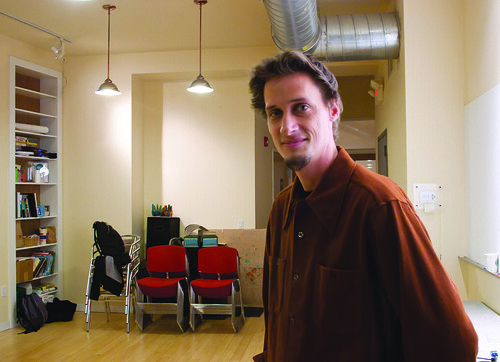Check out The Temple News’ exclusive video coverage as well as the print edition of the article. A general education class promotes activism where people least expect it.
Video by Saba Aregai and Haley Kmetz.
Each semester in his guerilla altruism class, professor Scott Shall gives his students $5 and 36 hours to create an act of guerilla altruism. Loosely defined as raising awareness about issues that affect society without permission from authorities, guerilla altruism is an experience more than anything else, Shall’s students said.
At 6:30 p.m. Thursday, Dec. 2, Shall’s class, along with Temple alumni and community members, gathered to witness presentations of the students’ final projects in Northern Liberties.

The theme of the presentations was food, with projects focusing on how to improve the health consciousness of the community. Students adopted some rather unorthodox methods to spread their message to the world.
Some of the students’ projects included replacing placemats at McDonald’s with their own fact-covered versions, with details such as the amount of oil in each order of french fries. Other projects involved stenciling facts on sidewalks in front of local eateries, such as the average calorie count of one meal.
Calling themselves “the Food Fighters,” one group of students placed labels on foods in a local grocery store, calling attention to the food’s potential to contain salmonella or E. coli. Sandra Valera, a junior advertising major and member of the Food Fighters, said she was confident about the legality of the group’s actions, demonstrating the courage of her group.
“The most that they can do is just kick us out because we wouldn’t really damage the goods. It’s just a sticker,” Valera said. “If anything, it might place a burden on some of the employees, but it’s something we are willing to risk because the word does need to get across.”
Through their efforts, the Food Fighters aimed to teach the community about the dangers of common bacteria that cause deaths every year.
Sierra Gladfelter, a junior anthropology major, took the course when the theme was issues related to water, such as corporate control of water, access to water and storm water in Philadelphia. This semester, she worked as a peer teacher for the class.
“At the beginning of the semester, the students watched a documentary on the food industry, and from that they selected a supposition and a quote from the film that guided their research,” Gladfelter said.
Then, the students put their research and projects into action.
Rachel Weisman, a freshman art major, calls her group “Nonorganic is Gross.” Like the Food Fighters, this team was also involved in labeling products, but its focus was on dairy.
“One person would be labeling, the other person would be looking out,” Weisman said. “We would just make sure that there was no one in the aisle at the time.”
Weisman said it was exciting to watch customers purchase the labeled dairy products and see the project in action.
This is the second time the class has been offered as a general education elective. Students can register for the guerrilla altruism course next fall, when the topic could likely be mass consumerism, Shall said, since the issue surfaced so much in his previous two classes.
Shall said the most important thing students take with them after the class is their transferring of knowledge to the community.
“I think [it is] the fallacy of trapping ideas in your own head and the value of putting things out there,” Shall said.
Haley Kmetz can be reached at haley.kmetz@temple.edu.
[Full disclosure: Sierra Gladfelter is a former columnist for The Temple News.]



http://www.causes.com/causes/73119-international-design-clinic?recruiter_id=28294617
SEE. THINK. MAKE. DO.